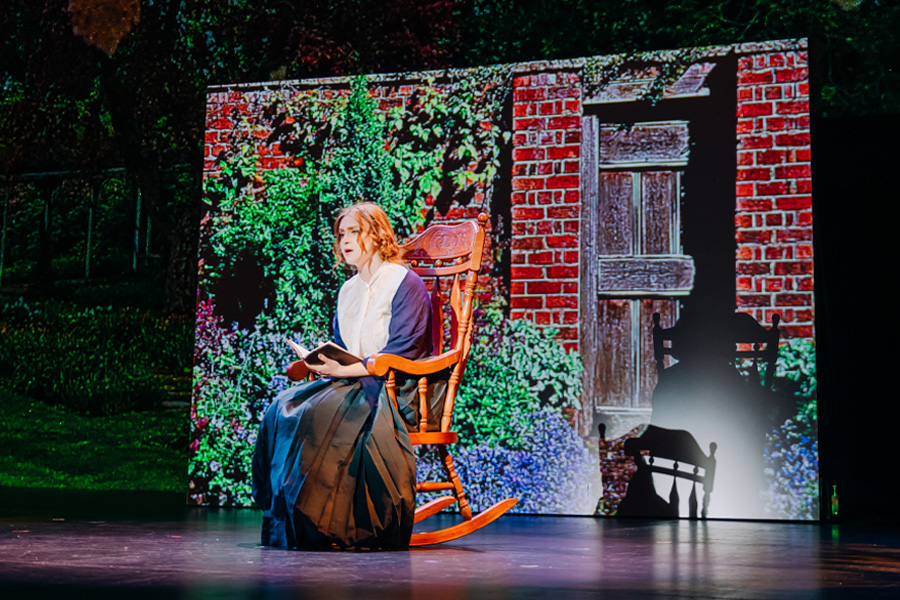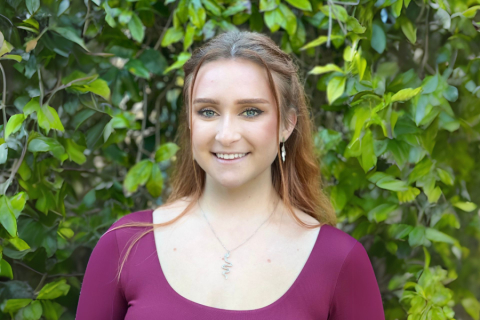A Voice for Angelica
M.F.A. candidate Abigail Mesel discusses her role in UCI Opera’s production of Puccini’s Suor Angelica: A Q&A Session
On Saturday, May 10, 2025, at 8 p.m., the UC Irvine Department of Music, the UCI Opera and the UCI Symphony will present Giacomo Puccini’s Suor Angelica at the Irvine Barclay Theatre. Directed and designed by Andreas Mitisek, conducted by Dr. Geoffrey Pope and with musical direction by Dr. Yuliya Minina, the production reimagines a 20th-century operatic classic.
Set in a 17th-century Tuscan convent, the opera follows a noble-born nun with a painful secret. Banished after bearing an illegitimate child, Sister Angelica has spent seven years longing for news of her son. When her unyielding aunt finally arrives, their encounter leads to one of opera’s most heartbreaking revelations. Puccini’s luminous score guides a story of love, loss and redemption.
Abigail Mesel (M.F.A. ’25, vocal arts) stars as Suor (Sister) Angelica. Her past performances include The Turn of the Screw and Finding Light: Alzheimer’s Stories. In this Q&A, Mesel shares her approach to the role and what audiences can expect from this powerful production.
Q: Can you tell us what first drew you to the role of Suor Angelica?
Abigail Mesel (AM): With the new structure of UC Irvine’s opera program, I was given the role of Suor Angelica right when the choice of opera was announced. In my subsequent character study, I felt connected to Angelica’s deep empathy and care for others. Also, the incredible vocal melodies and lush orchestration for this role made me even more excited to work on this opera.
Q: Puccini’s Suor Angelica is a deeply emotional story of loss and redemption. How did you prepare to embody such a layered and heart-wrenching character?
AM: The most important aspect of communicating complex emotions, especially in such a condensed opera, is pacing. Even though the performers know how the story ends, you have to embody the whole progression of the character. It’s easy to already be thinking about the tragic ending when the show has barely begun, but the complexity is lost if there is no sense of calm to be disrupted. Tapping into a wide span of emotions throughout the story, well beyond just those happening at the show’s climax, creates a much more holistic and authentic experience for both the performers and the audience.

Image: Abi Mesel as the Governess in Benjamin Britten's The Turn of the Screw. Photo by Will Tee Yang.
Q: What has been rewarding and challenging in preparing for this role, for your voice, your emotions, or both?
AM: Last year in our production of Britten’s The Turn of the Screw, I sang the role of Governess, who goes through a total anxious meltdown throughout the show. From that experience, I learned how to sing through hard emotions that can physically close the vocal musculature due to tension. In Suor Angelica, that skill becomes even more crucial as the highest or even lowest emotional moments have some of the most difficult melodies to sing because they are in a very high range or they span a very large range in a short amount of time.
Another challenge in preparing this opera, for myself and all the other students involved, is that this is the first time in about 10 years that UC Irvine has done a foreign language opera fully in its original language. In this process, all of the cast members have developed much more ease with singing in Italian, and we are even more aware of how important it is that we communicate the meaning of what we are singing with our acting, because it’s not a familiar language for the majority of our audience.
Q: The opera takes place in a 17th-century convent. How does the production bring that world to life on stage?
AM: Director and designer Andreas Mitisek has been incredible, coming up with creative solutions at every turn. We will be using projections and wooden sticks to create visual interest, along with limited costumes and props. As the vast majority of the cast is either currently in the UC Irvine Chamber Singers or has sung with them in the past, we are using our choir dresses for our costumes. With limited resources, we depend much more on our performance skills to bring the show to life.
Q: Is there a particular moment in the opera that you feel especially connected to, or that you think will leave a lasting impression on the audience?
AM: Almost every scene is so emotionally charged that there isn’t just one moment that sticks out in particular. Once Suor Angelica has met with her aunt, the last fifteen minutes of the show are a steep emotional journey with many heart-wrenching musical moments that almost guarantee that no one leaves the theater with dry eyes.
Q: As an M.F.A. student, how has this experience shaped or deepened your artistry?
I haven’t had an opportunity to perform repertoire from Puccini yet, so I am incredibly grateful for this experience because singing Puccini is absolutely integral to all opera students’ education.
Q: What do you hope audiences walk away feeling after watching Suor Angelica?
AM: The most important thing to me is that the audience feels they have had an authentic emotional experience. Puccini’s music and Forzano’s libretto bring to life the depth and complexity of Angelica’s journey, and as a performer, it’s my job to bring their meaning to the stage. I hope that audiences feel touched by the incredible music and motivated to live in their own authentic truth, not repressing their emotions, whether tragic or joyful.
For tickets and more information about Suor Angelica, visit here. To learn more about the Department of Music, visit music.arts.uci.edu.

